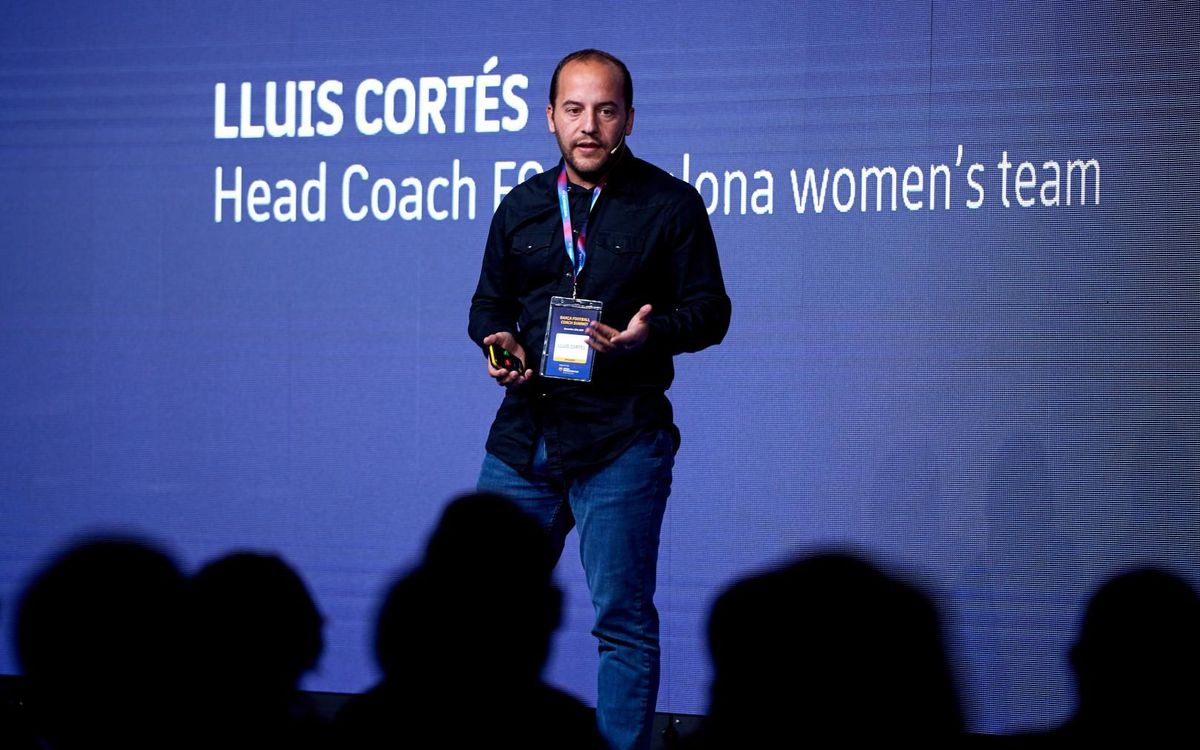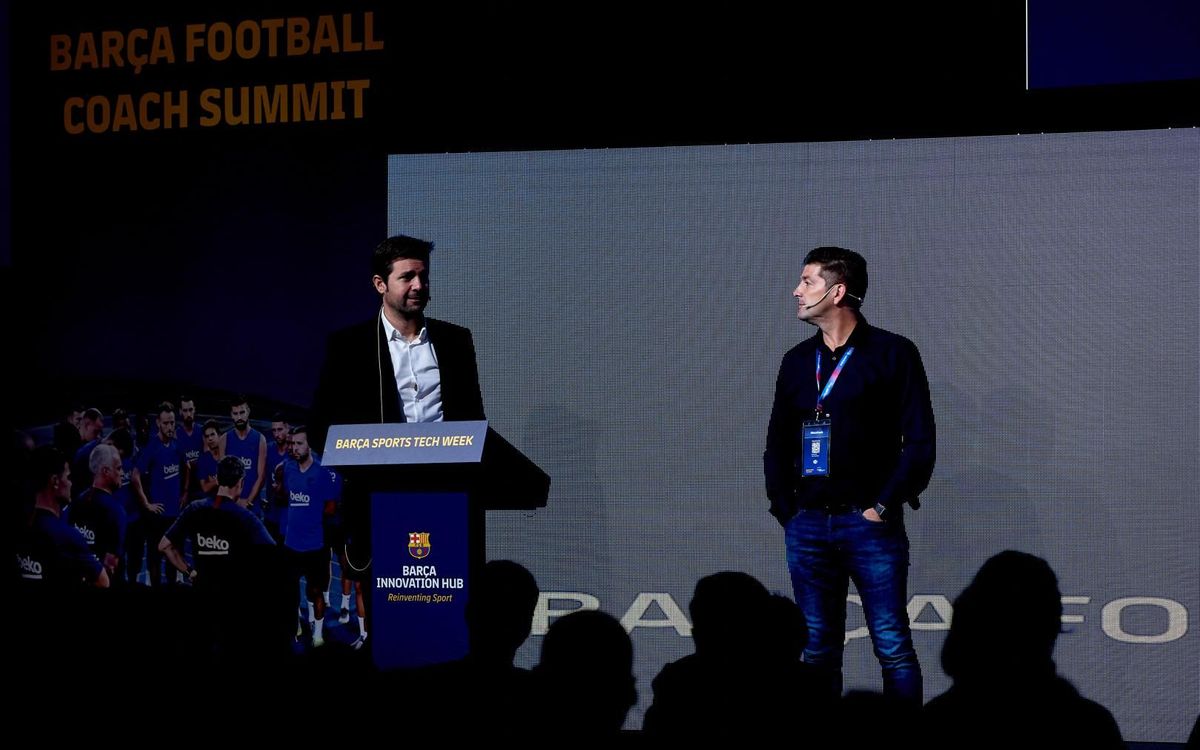Barça Football Coach Summit opens Barça Sports Tech Week
- label.aria.viber Viber
- label.aria.whatsapp WhatsApp
- label.aria.twitter Twitter
- label.aria.facebook Facebook
- label.aria.messenger Messenger
- label.aria.link label.aria.tick Copy link
This Tuesday brought the start of the second edition of Barça Sports Tech Week, an academic event dedicated to sharing experiences in the fields of technology, innovation and training methodologies, and discussing ways that data analysis can boost sports performance. The series of conferences is being organised by the Barça Innovation Hub, the platform that brings together all of the club's research, innovation and educational programmes. The first of these was the Barça Football Coach Summit.
The second edition of this event has brought together coaching staff from clubs around the world to discuss the possibilities of changing game dynamics through data usage, methodologies and education. FC Barcelona was represented by Isaac Guerrero, head of its Methodology Area; Lluís Cortés, coach of the women's football team and Franc Artiga, coach of the U19A team. The different panels also featured Juan Carlos Unzué (former Barça goalkeeper and current coach), Emma Hayes (coach of Chelsea's women's team) and Jagoba Arrasate (coach of Osasuna).
Franc Artiga emphasised that work with youth teams should not focus merely on winning trophies or competitions, no matter how important they are, but on player improvement. The U19 coach explained how he often meets players that have been in his teams and have gone on to turn pro, and they say they that rather than the trophies they won, the memories they truly treasure are of what they learned, what they improved, and the deficits that they overcame thanks to his advice. The strong point of his training methods are Preferential Simulated Situations, i.e. exercises that are based on the fact that the player can foresee both the loss and the recovery of the ball, and which cause such anticipation to come naturally so players are properly positioned whether attacking or defending.
Juan Carlos Unzué, the former coach of Girona, assistant manager to Frank Rijkaard, Luis Enrique and Pep Guardiola at FC Barcelona, explained that in order for the players to be more effective, the coach’s role should be that of a 'provider of both technical and emotional information'. His way of communicating with footballers is inspired by that of Johan Cruyff, who was his own coach between 1988 and 1991, who would tell his players that when they were on the pitch, and even if they didn't have the ball and weren't doing anything in particular, they could still be helping the team. His thesis is that the professional player must not only be able to improve, but must also want to do so. From his experience, "if the coach is a good speaker, the best players in the world will listen to him, because they are the first to understand that if they improve in keeping with the coach's guidance, then they will be able to achieve more ambitious goals."
For his part, Jagoba Arrasate, coach of Osasuna, presented a practical case of continuous training with a footballer, namely Argentine striker Chimy Ávila. He explained that until he had the chance to work with him in training, he could not appreciate the player’s real characteristics, even though he had seen videos and read reports. At first, he monitored every aspect involved in the player's life, from his personality to the way he related to his team-mates and his way of life in the host city.
Over the course of the season, although the player was performing very well, he was not conforming to the coach's instructions. Specific training exercises were scheduled for Chimy based on the repetition of techniques that were subsequently transferred successfully onto the pitch. On a psychological level, Arrasate exploited Chimy's dream of playing for Argentine national team to make him more receptive to his advice and instructions. The word that best summarises his philosophy as a coach is 'empathy', and always putting yourself in your players' shoes, whether they are top stars or substitutes.
Dinamo Zagreb coach Nenad Bjelica explained that his team's progress and improvement can be demonstrated empirically. All one needs to do is observe the revaluation of its players on Transfermarkt in recent years, reflecting an increase of 100 million euros in total squad worth. Zagreb's Champions League results, and Croatia's second place at the World Cup, also reflect the way the team has evolved.
This improvement was achieved by applying a 14-point programme that addresses all facets of the game and the person. Regarding training, he regrets that during the season, with a game every three days, it was hard to embed his philosophy in his players. This kind of work can only be done in the preseason. However, during this phase, he does not perform a single exercise that doesn't involve the ball. Not even for jogging, even though many players told him that that this was the toughest preseason of their lives. Once competition starts, he motivates his squad by rotating roles to ensure different players get to play the lead role. When it comes to games, he likes to apply something that he learned from Miguel Ángel Lotina: "There is no need to do exceptional things, just to do simple ones perfectly."

Particularities of women’s football
In the afternoon session, the coach of FC Barcelona's women's team, Lluís Cortés, proposed improvement of female players in the form of an equation. It's not about choosing between training to learn or training to win, but that training to learn is the way to win. However, Cortés showed that female football involves a series of nuances that make it different to the male variant. First, because girls usually start playing football later than boys. In addition, coaches of women's teams unfortunately do not tend to be the best ones, and are often viewed as 'the coaches that no other teams want'. There is also competitive imbalance. Tournaments don't tend to be well matched. There are teams like Barça that gather all the best and struggle to find similar standard opposition and a lot of young female players have not been properly tested. And the physiology of women is different, as well as their psychology. Nevertheless, although the gap is narrowing year by year, women's football should not aspire to the same level as the men's game, but should be developed separately with its own characteristics.
Michel Sánchez, coach of the SD Huesca, stressed that, obvious as it might sound, football is a game and that is how it should be understood. And like in any other game, players should have fun and learn on the fly, for this is how improvements happen. "It's not about making players better, but about players making themselves better," he said. More specifically, Michel states that his teams are organised as a circle, not as a hierarchical pyramid. From the kit man to the coaches, from the starting XI to the subs, they are all part of a family.
Finally, Isaac Guerrero moderated a discussion, where he pointed out that "the role of the coach, in terms of intervention and interaction with the player, is a matter of paramount importance to understand and optimise the training and performance process." All the speakers discussed different concepts of their philosophies. The issue that caused the most disagreement is the freedom for more talented players to be more creative, to improvise on the pitch outside of the coach's system and orders. Bjelica said that he sometimes turns a blind eye to allow his most prominent players to be inventive at certain times, although the best thing is for the team to create the right situations for improvisation. Michel, however, disagrees. He feels players should only be creative if they respect their team's game plan. For a player to improvise, the whole team needs to develop ways for this situation to occur. For Jagoba Arrasate, creativity is a very relative concept, because it changes from one player to another. He believes that coaches tend to have higher regard for the performance of "non-creative" players. Finally, Unzué has noted that in the past players were not coached in attacking football so as not to restrain their creativity and tactics only focused on defensive aspects.
- label.aria.viber Viber
- label.aria.whatsapp WhatsApp
- label.aria.twitter Twitter
- label.aria.facebook Facebook
- label.aria.messenger Messenger
- label.aria.link label.aria.tick Copy link

